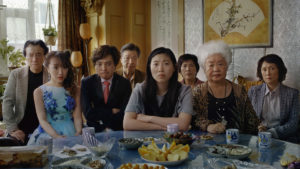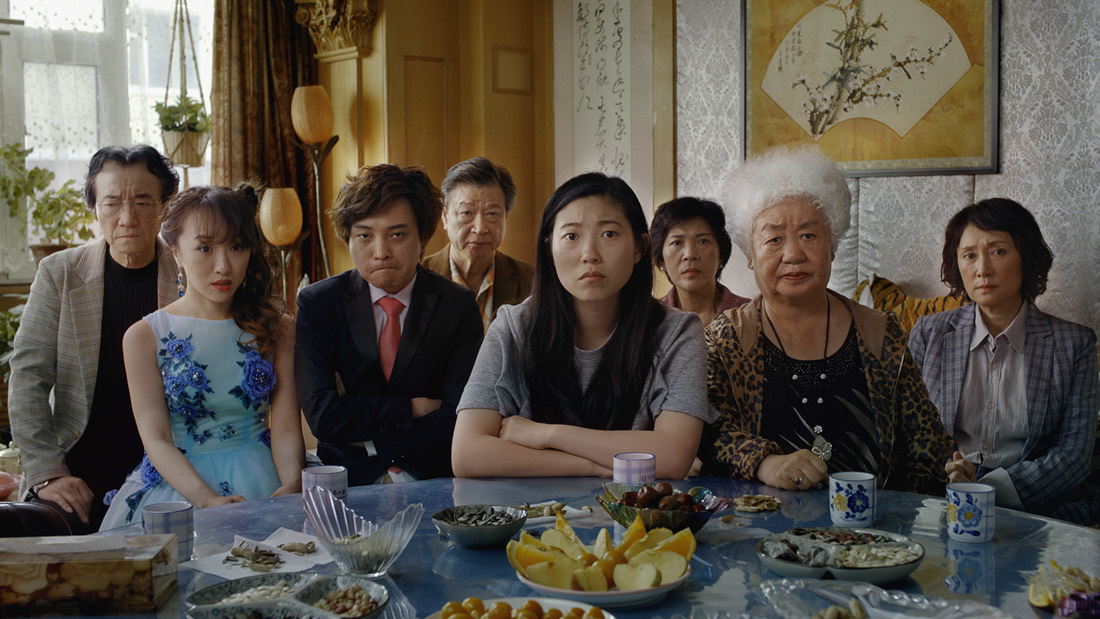Movie Info
Movie Info
- Director
- Lulu Wang
- Run Time
- 1 hour and 40 minutes
- Rating
- PG
VP Content Ratings
- Violence
- 0/10
- Language
- 1/10
- Sex & Nudity
- 1/10
- Star Rating
Relevant Quotes
Honor your father and your mother...

Writer/director Lulu Wang gives a peek into both Chinese culture and that of the immigrant in her warm comedy that begins and ends in New York City, but which unfolds mainly in a large city in China. Its statement upfront “Based on an actual lie” leads us to expect an unusual comedy, and the filmmaker delivers, loosely basing her script on a family experience.
Aspiring writer Billi (Awkwafina), hoping for a Guggenheim Fellowship, was raised by her immigrant parents in America, but through visits and social media, has kept in close contact with her beloved grandmother (Zhao Shuzen), back in China. Speaking in Mandarin, she calls her Nai Nai.
When the grandmother’s younger sister, known as Little Nai Nai (Lu Hong) and who has been caring for her, receives the results of a CT scan, she telephones the family that Nai Nai has about three months to live due to stage 4 lung cancer. Billi’s mother Jian (Diana Lin) and father Haiyan (Tzi Ma) prepare to fly to Changchun, China for a last visit, as well as relatives living in Japan and other parts of China. Little Nai Nai insists that for the sake of the old woman’s peace of mind they not tell her the diagnosis. The excuse for the family reunion will be a hastily arranged marriage of a relative’s son living in Japan with a girl he had just met there.
All of the family agree to keep Nai Nai’s condition secret. Because Billi objects so strongly to this, her parents decide she should stay behind in New York. But then, loving the old woman so much, Billi dips into her meager savings and shows up shortly after the arrival of the parents. She promises that she will not spoil the plan in keeping news of the cancer from Nai Nai. Apparently, it is a kind that is not intrusive, the old woman’s main complaint being she feels tired.
What follows is a series of interactions among the old and the young of the family revealing both the differences and the similarities of families on opposite sides of the Pacific. Those who love wedding movies will enjoy the exchanges among the relatives and the eccentric speeches/toasts given under the influence of so many draughts of saki.
This is a comedy in the best sense of the word in that every frame is filled with love, unlike some American comedies about family reunions (usually centered on Thanksgiving or Christmas). Foibles of a character are on full view, but also more positive aspects. During one family conversation the story is shared how music-loving Billi gained access to a piano when she was six years-old in New York City. The family showed up in church one Sunday, and members noticed that Billi was drawn to its piano. As the family was leaving, the pastor gave them a key, telling them that any time Billi need to practice, the key would let them in.
During a conversation about the difficulties of life—I think it is the one in which Billi reveals that she had received a letter telling her that she would not be getting the Guggenheim grant–Nai Nai tells Billi, “Life is not just about what you do, but about how you do it.” I will not spoil what happens at the climax, except to say that it is delightfully appropriate and uplifting. Writer/director Lulu Wang even posts some photos of her real grandmother and family as the end credits roll. This is one of those feel-good films that will be fun to talk about when your own family gets together. Central to any discussion is the question as to whether or not a beloved parent/grandparent be told of impending death. Those arguing in favor are concerned for the peace of mind of the person, certainly a worthy motive. But does this render honor to her (or him), as the commandment demands? Rather, does it nor reduce the elderly person to that of a child, for whom decisions must be made by a superior person? The film itself, being an entertainment and not a moral essay on parent-child relations, perhaps dodges these questions, but they still remain.
This review will be in the September issue of VP along with a set of questions for reflection and/or discussion. If you have found reviews on this site helpful, please consider purchasing a subscription or individual issue in The Store.

